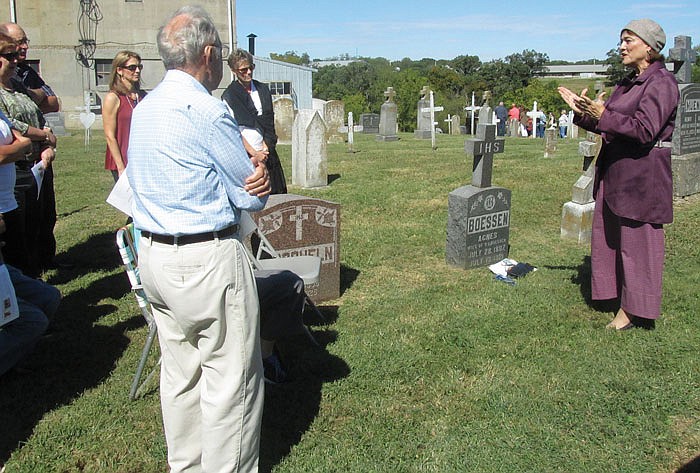Agnes Boessen died tragically in 1921 at her Loose Creek farm, holding her 2-week-old son in her arms.
"Voices of the Past," a cemetery re-enactment put on by Immaculate Conception-Loose Creek, gave Linda Boessen Kress reason to return to her hometown to tell the story of Boessen, her grandmother.
"It's not a big story, but it's a story about courage and tragedy and love," she said. "So it has elements of a lot of old Germans who came to this area; they had to be strong and they had to live through tragedy, and they had to have courage."
Boessen was one of 10 re-enactors featured at the event.
Around 100 people paid $10 to attend the event, which raised money for the church's upcoming 175th anniversary in 2020.
In Boessen's presentation, she told how her grandparents contracted typhoid fever on their farm, southwest of Loose Creek. At the time, it hadn't been long since the Spanish flu took its toll, so people were afraid to bring medicine to sick families such as the Boessens.
Many people refused to bring medicine until one man did. It saved the life of Boessen's grandfather, but it took his hearing. Her grandmother wasn't as fortunate. She had given birth to a son (Boessen's father) two weeks earlier, and she died with the baby in her arms.
Boessen portrayed her grandmother wearing a cloche hat, purple suit coat and long mauve skirt.
Being able to do the portrayal meant a lot to her.
"My parents are gone," she said. "I've been away from Loose Creek for a long time. I love coming back to here to help do this and getting connected with old friends and thinking about the old people that I knew. In my youth, I knew a lot of old people who could remember their great-grandfather who came over" to the United States.
"That's kind of all gone. It's a younger generation now."
Her family came from Lank, Germany, in 1835. Even 100 years later, they could speak English, but German was still their first language, Boessen said. For people who say Spanish-speaking people in the United States should learn and speak English, she advises: "You have to give it some time."
Another re-enactor at the event was Glenn Robertson, portraying his great-great-grandfather, Theodore Lock.
Lock made a three-month trip from Germany to Loose Creek in 1841. He and others left an oppressive environment. Jobs weren't available and people were going hungry, Robertson said.
Father Ferdinand Helias founded several Mid-Missouri Catholic churches, including Immaculate Conception-Loose Creek. He wrote back to people in Germany and told them about the "land of milk and honey" in Mid-Missouri, Robertson said, which led to a large influx of Germans to the area.
Robertson said Lock bought a farm east of Loose Creek and started Lock's Mill, which ground wheat, bran and wheat shorts into flour. The mill was ground by oxen that were led around a circle, with the grist stone in the middle.
It was the oldest mill in the United States operated by the original founding family, Robertson said. It operated from 1863 until about 10 years ago when it was sold and closed.
Lock also started a saw mill. During the Civil War, Confederates took over the mill and used it to make grain for their troops. They paid Lock with Confederate money, which was worthless. After the Civil War, Lock retrieved an engine from a riverboat that sank in the Missouri River. The engine was the first such source of power in Loose Creek, he said.
During the 1880s, Loose Creek was a thriving community, with a doctor, two hotels, a saloon, cabinet maker and blacksmiths.
Robertson wasn't a history buff until he was asked to do the portrayal of Lock, but he said learning the history is addicting, and it was a pleasure to share his family stories with others.
"I'm very proud," he said. "What a tradition. And what hard-working, good people they were. They were very religious. That's why we have a Catholic church here today."

